Peggy Seeger - Interview
by Nick Dent-Robinson
published: 27 / 8 / 2012
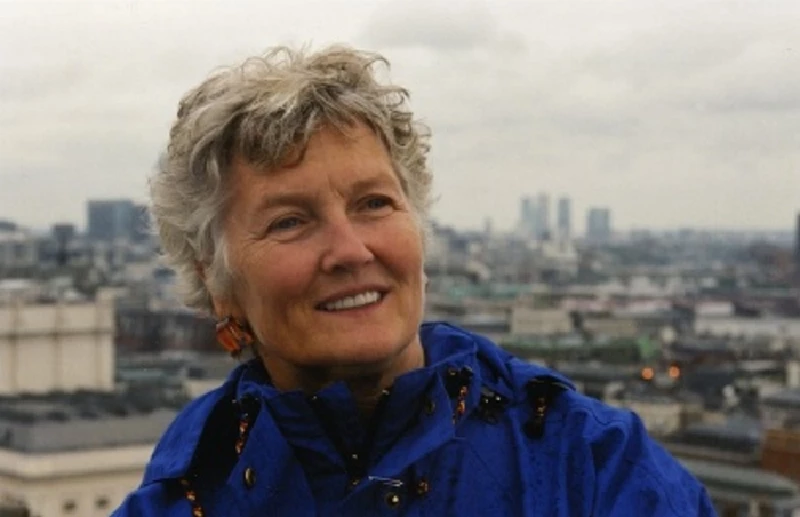
intro
Infleuntial folk musician and singer-songwriter Peggy Seeger talks to Nick Dent-Robinson about her long solo career, marriage to Ewan MacColl and recent collaboration with dance producer Broadcaster
There is a long tradition in popular music of collaboration between fashionable contemporary performers/producers and iconic female singers whose talents a new generation may not fully appreciate. In the music business it is often seen as a career rescue tactic. There have been the Bee Gees with Dionne Warwick; Morrissey with Sandie Shaw; Lulu with Take That and with Boyzone, plus, perhaps most memorably of all, the Pet Shop Boys with Dusty Springfield in the 1980s which led to a huge and welcome late career boost for the soulful Dusty after the success of ‘What Have I Done to Deserve This’ and then ‘Nothing Has Been Proved’. So this is a tried and tested formula. But I would never have anticipated 77 year-old grandmother Peggy Seeger - half sister of Pete Seeger, with her purist reputation and impeccable American folk credentials, cooperating with experimental electronic dance music producer Broadcaster to create what clubgoers everywhere are proclaiming as the year's best dance track. This is the lead single from ‘Folkspoitation’, a highly innovative album by the mysterious Broadcaster - who some in the music business have whispered may not be entirely unrelated to 44 year-old ex-indie musician Lewis Atkinson. The track bravely fuses Peggy's still rich and potent voice with the heavily-rhythmic, multi-layered, many-sampled sounds and electronic wizardry that is Broadcaster's trade-mark. Even more bizarrely, the song featured on the lead track that has unexpectedly propelled Peggy into this ultra-modern and alien world is ‘The First Time Ever I Saw Your Face’. There have been over 60 cover versions of this song including by Elvis, Johnny Cash, George Michael and, perhaps best known, by Roberta Flack – whose recording of it was featured by Clint Eastwood in his ‘Play Misty For Me’ film back in 1971. What many of Broadcaster's club-going fans won't realise, however, is that this song was originally written in 1956 for and about the 21 year-old Peggy Seeger - by her then lover, the British folk singer Ewan MacColl who was destined to be Peggy's husband and the father of her three children. It was during what was then a rare and hugely expensive phenomenon, a transatlantic telephone call, that the love-sick, Salford-born Ewan first sang those lyrics to Peggy Seeger. Ewan, then married to someone else, had fallen for Peggy, the love of his life. Peggy was the first to record the song and she and Ewan were eventually together until his death in 1989. So, there is quite a story here! I meet the softly-spoken Peggy - who looks remarkably spry and youthful - at her comfortable home in Oxford. Her pretty house is tucked away in a tranquil corner of that university city, surprisingly secluded and perfectly shaded by mature trees. I start by asking if Peggy actually likes her new recording of this iconic song. Wasn't it hard to re-record it in such a different way.....wasn't there a big emotional attachment to overcome? “I love the recording,” Peggy begins, smiling brightly at the irony of it all. “Broadcaster's identity is strictly secret, of course. I've known him for 15 years. He is a good friend of my daughter Kitty. And I think he's a genius. Musically he is just so innovative. He does things others wouldn't dream of. I greatly admired Broadcaster's first project, ‘Primary Transmission’, which my son Calum helped produce. It was based on the ‘Radio Ballads’ - the ground-breaking 1950’s/60’s BBC radio series that was an aural tapestry combining field recordings of speech and sounds with new songs Ewan wrote in the folk idiom.” “People imagine I'm a purist but down the years I have done classical music, pop music and written rap songs and I'm very open to new ideas. I like pushing the boundaries and making people listen and think. Though for a couple of decades or so Ewan and I did have a credo, a discipline, of what we would and wouldn't do with folk songs - partly so that new singers understood how folk music had evolved. Our idea then was that folk music should normally be unplugged. But folk music, like all music, has always been developing, evolving.....it has never been cast in stone.” “I'm not qualified to be a purist anyway - I was not brought up on the front porch of an Appalachian cabin playing the banjo. I had a classical education and inevitably that feeds into whatever I do....it's pointless to deny that. I'd always thought of ‘First Time Ever I …’ as a happy song. But Broadcaster wanted to make it sad, more poignant - an older woman reflecting on the past. My son Calum worked with me on the recording and he insisted I sing it at the very bottom of my range - which I did. In the end I think it worked. And I like the other tracks on the album too. Broadcaster asked me to sing him 50 unaccompanied songs in a day - I can do that. It's my trade.” Broadcaster then took the ones he wanted, sampled from them and gave them the full vocoder treatment to produce a hustling, urban and ultra-modern sound. Peggy Seeger's past compositions included women's movement anthems like ‘Gonna Be An Engineer’ as well as the poignant ‘Ballad of Springhill’ which is now regarded in America as a traditional song. Her work has always been lyric-centred with timeless and often quite dark themes - including violence, exploitation, drug addiction and abusive relationships. These have a contemporary resonance which perfectly fits Broadcaster's production style, and the new album combines his edgy techno beats with Peggy's distinctive vocal input surprisingly effectively. Though inevitably there will be traditionalists who are left unenthused or even outraged. “It's true that ‘Folksploitation’ has put the cat amongst the pigeons with some in the folk scene. But I can live with that,” Peggy says with feisty zest. What would Ewan MacColl have thought of Broadcaster's treatment of his song? “There would have been a time when he'd have hated it. But later in his life Ewan was far more relaxed about these things and I think he would have approved,” Peggy reflects. “He would have liked that Kitty and Calum were involved too. They are carrying on the family's musical tradition. Calum is musical director for Ronan Keating and has his own record company; Kitty is involved in music management though she trained as a graphic designer and did the artwork for Broadcaster's ‘Folkspoitation’ album. Our other son Neill is a musician and producer too. Recently he has been working with Marianne Faithfull.” Peggy's own musical background is fascinating. She is part of one of America's iconic musical dynasties. Her father Charles Seeger was born in 1886 and was a pioneer ethno-musicologist with a keen interest in folk music. He was head of the music department at Berkeley in California. He became radicalised there and was a communist for a time. Later he was a professor at New York's Julliard School. Peggy's mother, Ruth Porter Crawford, was an accomplished classical pianist and avant garde classical composer who won the Guggenheim Fellowship Award for Music. Her biography is required reading in the music departments of many North American universities. Sadly she died when Peggy was just 18. Peggy's late brother Mike was an accomplished folk performer and multi-instrumentalist. And Peggy's half-brother is Pete Seeger - one of the foremost American folk and protest singers of the 1940s, 50s and 60s who was an inspiration to the whole 1960s generation and people like Bob Dylan. Pete, now 93, is still performing, still politically active. In 2009 he led the singing at President Obama's inaugural celebrations alongside Bruce Springsteen, Stevie Wonder, Beyonce and others. So the Seeger household must have been an exciting and radical environment for Peggy as a child? “In many ways it was. Though my parents never imposed their liberal values on us and politics did not dominate our lives. In fact it was hardly talked about at all. There was a lot of music though. And a constant stream of interesting visitors. There were many revivalist folk musicians passing through – and Woody Guthrie, Lead Belly, John Jacob Niles were all regular callers. I was born in New York City but later we lived in Silver Spring, Maryland and by the time I was eight we'd moved to a big house in Chevy Chase, an affluent neighbourhood on the edge of Washington DC. Our home always seemed to be full of lively and stimulating people, children, music, laughter. And whenever Pete stopped by - he was sixteen years older than me - he'd be playing his banjo, singing, storytelling.....Mike and I loved that. By the age of six I was a reasonable classical pianist, and at eleven I'd mastered guitar and was composing tunes and transposing music. By fifteen I was playing banjo, mandolin, auto-harp and dulcimer too. Then I went off to Radcliffe College in Boston to study music.” “Next I went travelling. To Holland for a while and to Africa, Poland, Russia and to China. I was recently reading the diaries I wrote back then. I am surprised at how radical I was and how understanding I was of the situation in 1950s China. There were forty of us travelling in a group. The Chinese were very welcoming and surprisingly open about everything. We went where we liked, and only once do I recall being told we could not go somewhere.” But this was the McCarthy era when there was huge suspicion of a US citizen having any association with communism or socialism, and Peggy's visit to China caused huge hassle with the State Department back in the USA. “I'd no idea at the time what a headliner it was; a really big news story. They withdrew our American passports. I decided I didn't want to return to America. But when we got back to Europe the Americans put huge pressure on different governments not to admit us. I was kicked out of France, Holland and Belgium at various times and ended up working in Denmark and Britain. I'd been invited to England to play five string banjo with a group of folk musicians on a new TV show. I met Ewan at the first rehearsal in a basement flat in Chelsea. I did later travel to America but that was on a British passport when I'd acquired British citizenship after I married. The USA did not allow me to have my American passport back until after 1992 - in President Clinton's time!” Peggy was unable to marry Ewan for some years as he needed to divorce first. Before that could happen Peggy's British visa expired and she left the country for France. In Paris she married one of Ewan's friends, the folk singer Alex Campbell in what she describes as a “hilarious ceremony” - undertaken so she could gain British citizenship and continue her relationship with Ewan. “Alex was a really nice rapscallion....a wonderful man. I married him on Ewan's birthday; it was part of my commitment to Ewan. I then swore allegiance to the Queen and became a British subject so I could stay in the UK and come and go as I wished. Later Ewan and I married, and we were together and based here in England until Ewan died in 1989. We were inseparable.” Throughout all these years Ewan and Peggy were key figures in the international folk scene. From 1959 they had encouraged and set standards for the burgeoning UK folk revival. They trained other singers in documentary theatre. They released joint and solo acoustic albums, were featured in documentary films and performed many hundreds of gigs plus raised their three children. It was not until five years after Ewan's death that Peggy decided to return to live in the USA. Initially she lived in Asheville, North Carolina. “It is a small town in the mountains. At first I knew nobody there but I soon did. It's a friendly place with lots of folk musicians. Then I left to teach song-writing at Northeastern University in Boston, and I had a great time with some wonderful students. But America had changed totally from the place I grew up in. The huge highways, the television, billboards everywhere, so much ugliness...and my children and grandchildren were all back in England. I realised how I'd come to feel so totally at home in England, and after touring here for over 30 years I probably know the country better than many English people do. In the end I just found America too big and, you know, there's a huge linguistic difference. Though I still think America is a fantastic country and I'm glad I went back for a time. I was singing folk songs that came from there and I enjoyed touring in America for a while. But you know it is interesting....I was never booked to perform in the South, wasn't hired once to sing below the Mason Dixon line!” “When I finally returned to England in 2010 I decided to live in Oxford, which I had always loved. I'd developed a hunger for history, for ancient things, when I was back in America. For twisty country lanes and pubs and cottages with thatch; medieval churches; picturesque countryside. I'm a hopeless romantic for my sins! And Oxford is a hub - I can reach London, Cornwall, Birmingham and even Scotland quite quickly when I tour. It's funny though. Because when I came back to England I noticed how much it had changed too, in the sixteen years I'd been away. It is so much more diverse ethnically - which I welcome. Though it is important these changes are handled well and I do worry that some of the new arrivals are not melding in as well as they should be. There needs to be more encouragement of that.” What are Peggy's future plans? “I usually schedule a year ahead and will be doing more touring. Within the next six months or so I'll have another album released. It is a recording of me reading love poetry I wrote. It is all poetry for my present partner, Irene Pyper-Scott. We've known each other many years...Irene was originally from Northern Ireland and she's well known as a singer on the folk circuit. We have worked together but she never liked touring while I thrive on it. She was a huge comfort to me after Ewan died; I am not sure I would have made it otherwise. Irene lives in New Zealand now but we visit often. My son Calum produced the album and my daughter Kitty is designing the cover. Calum says it makes good small talk when he casually mentions he's been recording his mother's lesbian poems! I've learned a lot from Irene. She moved me on to understand how to use humour on stage - which Ewan and I rarely did because we were so political.” Reflecting now, does Peggy have any big regrets? Are there things she'd have done differently? “Not really. Though I do wish I could have known my mother more. Eighteen is a young age to lose your mother. I think she'd have been fascinated by my life. She was a wonderful woman but she didn't put herself out there in the way I have. There is a lot I'd like to thank her for. One remaining ambition I have is to meet Paul Simon. I absolutely love his work - he gets everything just right always. And I would be thrilled to meet him. I'm thinking of renting Carnegie Hall in New York for my 80th birthday and having a big concert. We did that for my 70th when we rented the Queen Elizabeth Hall on London's South Bank, which was wonderful. Well, if we do end up at Carnegie Hall in 2015, wouldn't it be amazing if Paul Simon could be there too?” ‘Folksploitation’ by Broadcaster featuring Peggy Seeger is released by Red Grape Records and available from all good music outlets.
Band Links:-
https://twitter.com/peggyseegerhttp://www.peggyseeger.com/
https://www.facebook.com/PeggySeegerMusic
Picture Gallery:-
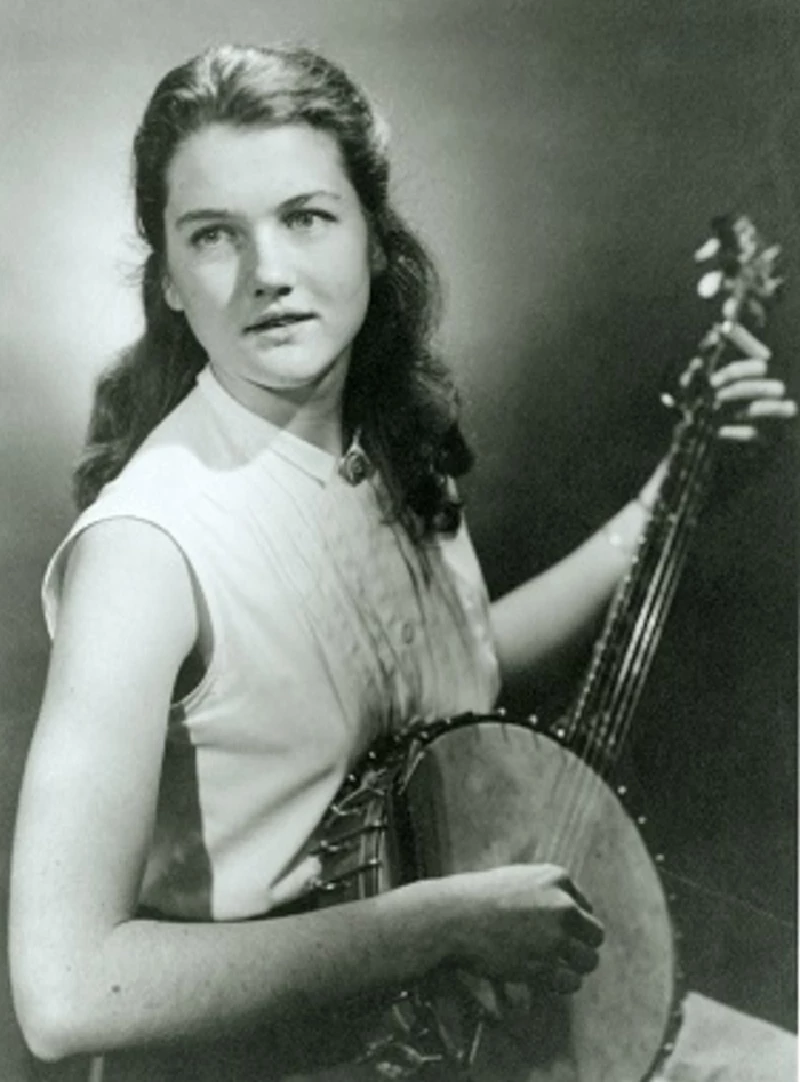
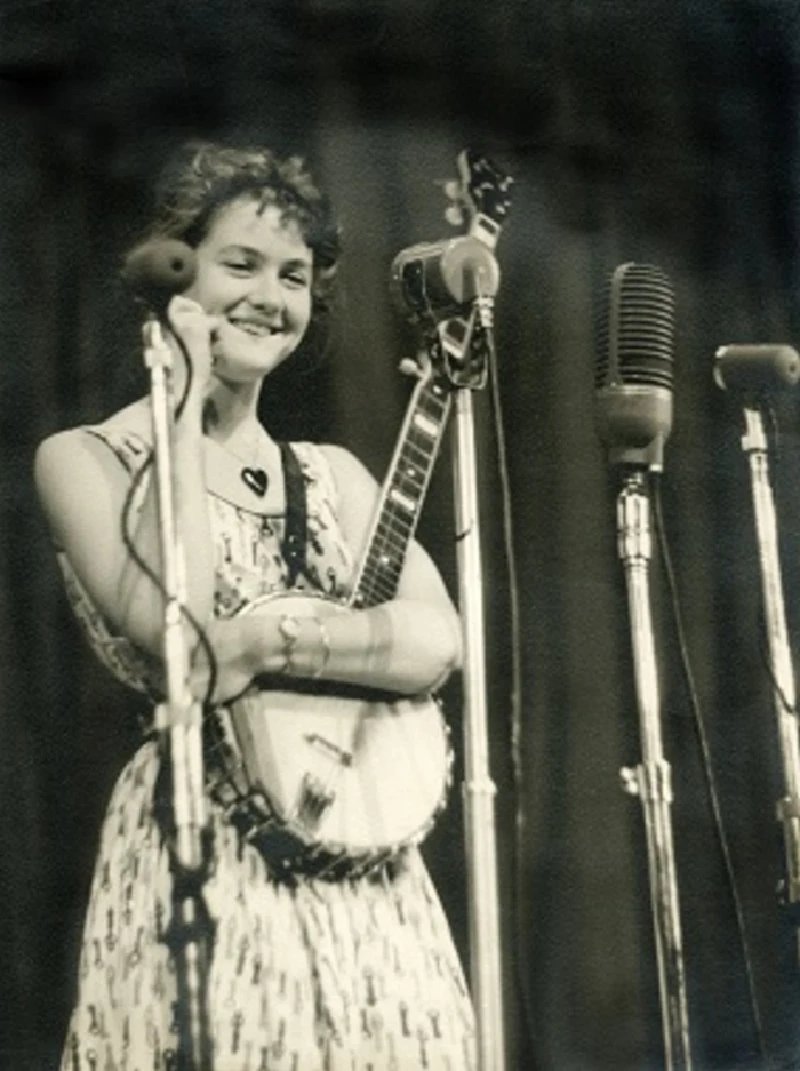
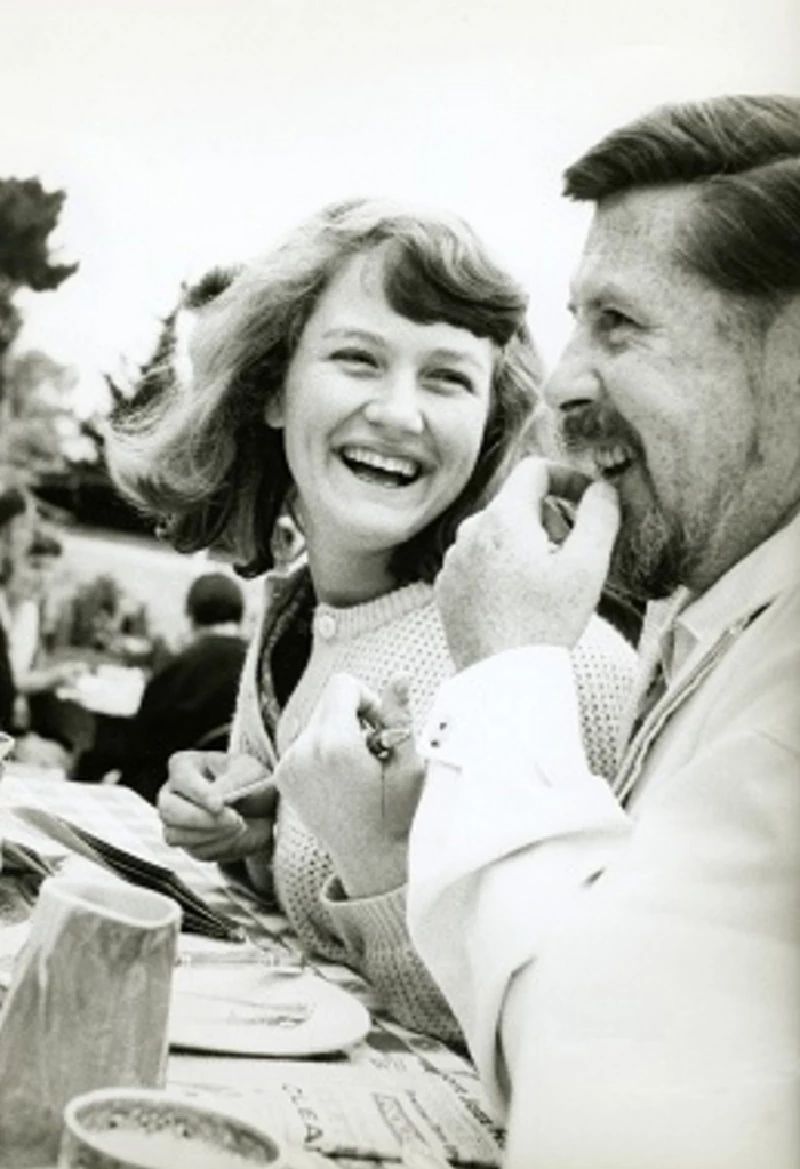
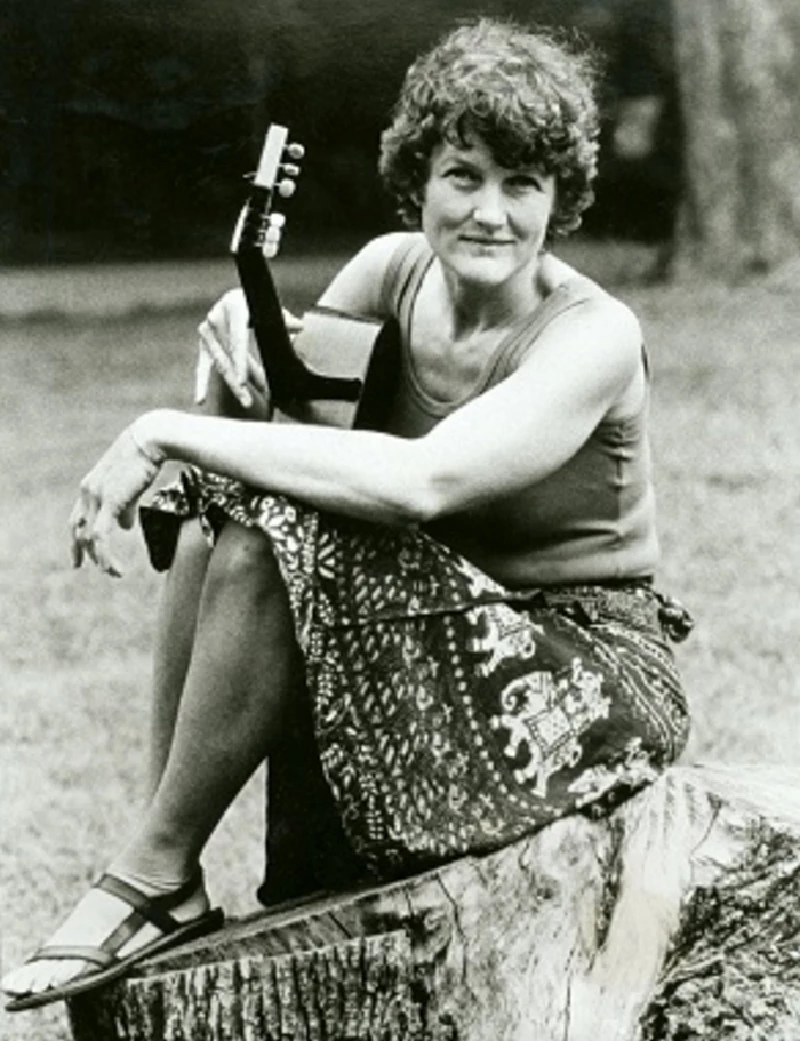
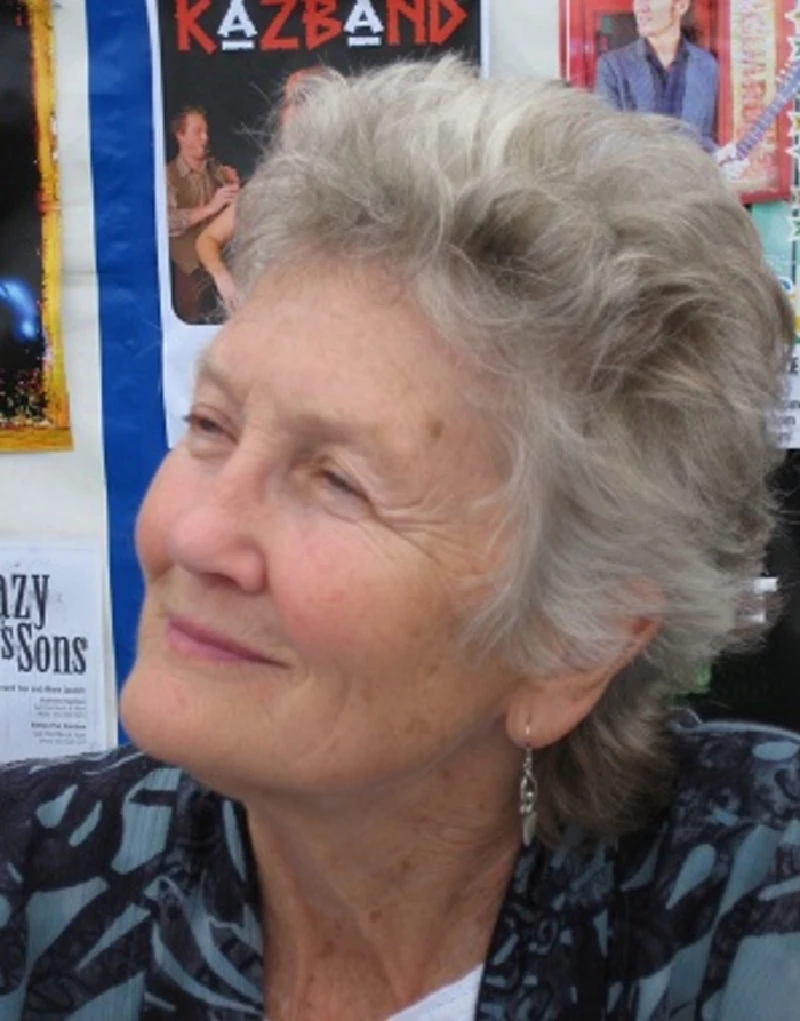
Visitor Comments:- |
| 589 Posted By: Wayne Seymour, Reidsville, NC USA on 17 Sep 2012 |
|
Peggy is basically right, although she did one concert at Elon College in North Carolina, and did teach at the Swannanoa Gathering in Black Mountain, NC.
She's a remarkable woman, and a consummate musician.
|
soundcloud
reviews |
|
Everything Changes (2014) |
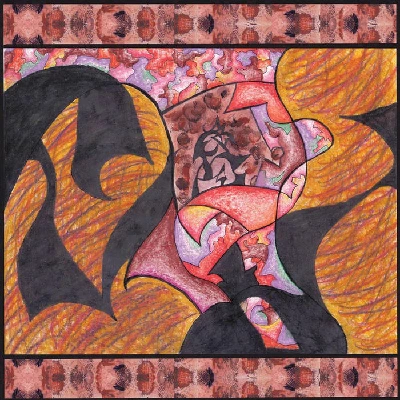
|
| Elegiac latest album from veteran folk artist and singer-songwriter, Peggy Seeger |
most viewed articles
current edition
Carl Ewens - David Bowie 1964 to 1982 On Track: Every Album, Every SongArmory Show - Interview with Richard Jobson
Colin Blunstone - Thalia Hall, Chicago, 16/7/2025
Bathers - Photoscapes 1
Visor Fest - Valencia, Spain, 26/9/2025...27/9/2025
John McKay - Interview
Billie Eilish - O2 Arena, London, 10/7/2025
Robert Forster - Interview
Sir Tim Rice - Interview
Loft - Interview
previous editions
Heavenly - P.U.N.K. Girl EPManic Street Preachers - (Gig of a Lifetime) Millennium Stadium, Cardiff, December 1999
Beautiful South - Ten Songs That Made Me Love...
Oasis - Oasis, Earl's Court, London, 1995
Pixies - Ten Songs That Made Me Love...
Trudie Myerscough-Harris - Interview
Doris Brendel - Interview
Prolapse - Interview
Simon Heavisides - Destiny Stopped Screaming: The Life and Times of Adrian Borland
Paul Clerehugh - Interview
most viewed reviews
current edition
Sick Man of Europe - The Sick Man of EuropeLucy Spraggan - Other Sides of the Moon
Amy Macdonald - Is This What You've Been Waiting For?
Phew, Erika Kobayashi,, Dieter Moebius - Radium Girls
Davey Woodward - Mumbo in the Jumbo
Bush - I Beat Loneliness
Blueboy - 2
Alice Cooper - The Revenge of Alice Cooper
Cynthia Erivo - I Forgive You
Suzanne Vega - Flying With Angels
Pennyblackmusic Regular Contributors
Adrian Janes
Amanda J. Window
Andrew Twambley
Anthony Dhanendran
Benjamin Howarth
Cila Warncke
Daniel Cressey
Darren Aston
Dastardly
Dave Goodwin
Denzil Watson
Dominic B. Simpson
Eoghan Lyng
Fiona Hutchings
Harry Sherriff
Helen Tipping
Jamie Rowland
John Clarkson
Julie Cruickshank
Kimberly Bright
Lisa Torem
Maarten Schiethart